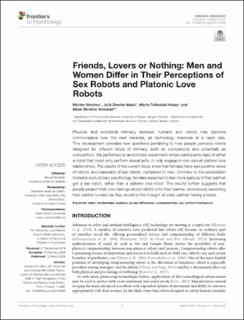Friends, lovers or nothing: Men and women differ in their perceptions of sex robots and platonic love robots
| dc.contributor.author | Nordmo, Morten | |
| dc.contributor.author | Næss, Julie Øverbø | |
| dc.contributor.author | Husøy, Marte Folkestad | |
| dc.contributor.author | Nordmo, Mads | |
| dc.date.accessioned | 2021-09-17T15:22:40Z | |
| dc.date.available | 2021-09-17T15:22:40Z | |
| dc.date.created | 2020-06-10T14:06:53Z | |
| dc.date.issued | 2020 | |
| dc.identifier.citation | Frontiers in Psychology. 2020, 11 1-10. | |
| dc.identifier.issn | 1664-1078 | |
| dc.identifier.uri | https://hdl.handle.net/11250/2778958 | |
| dc.description.abstract | Physical and emotional intimacy between humans and robots may become commonplace over the next decades, as technology improves at a rapid rate. This development provides new questions pertaining to how people perceive robots designed for different kinds of intimacy, both as companions and potentially as competitors. We performed a randomized experiment where participants read of either a robot that could only perform sexual acts, or only engage in non-sexual platonic love relationships. The results of the current study show that females have less positive views of robots, and especially of sex robots, compared to men. Contrary to the expectation rooted in evolutionary psychology, females expected to feel more jealousy if their partner got a sex robot, rather than a platonic love robot. The results further suggests that people project their own feelings about robots onto their partner, erroneously expecting their partner to react as they would to the thought of ones’ partner having a robot. | |
| dc.language.iso | eng | |
| dc.title | Friends, lovers or nothing: Men and women differ in their perceptions of sex robots and platonic love robots | |
| dc.type | Peer reviewed | |
| dc.type | Journal article | |
| dc.description.version | publishedVersion | |
| dc.source.pagenumber | 1-10 | |
| dc.source.volume | 11 | |
| dc.source.journal | Frontiers in Psychology | |
| dc.identifier.doi | 10.3389/fpsyg.2020.00355 | |
| dc.identifier.cristin | 1814817 | |
| cristin.ispublished | true | |
| cristin.fulltext | original | |
| cristin.qualitycode | 2 |
Tilhørende fil(er)
Denne innførselen finnes i følgende samling(er)
-
Scientific articles [2181]
